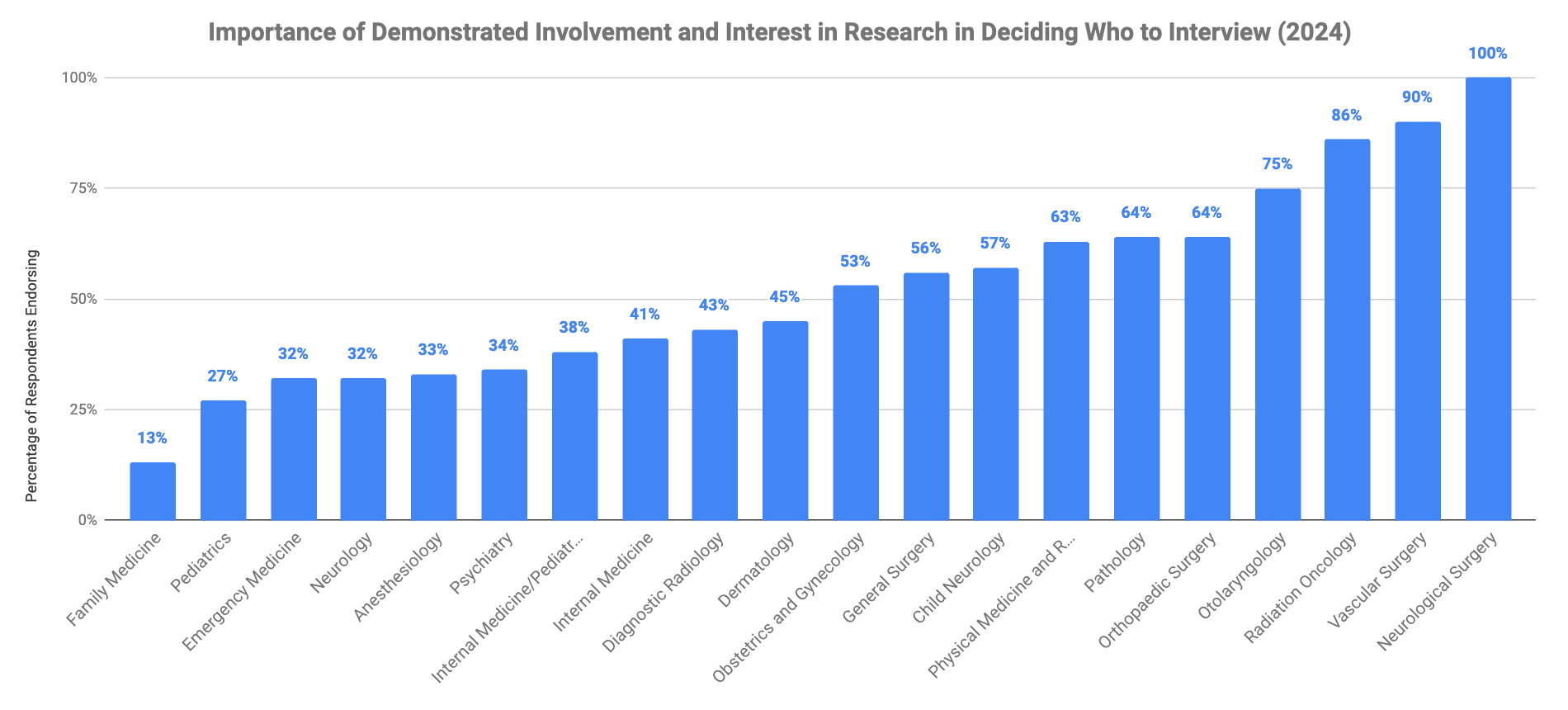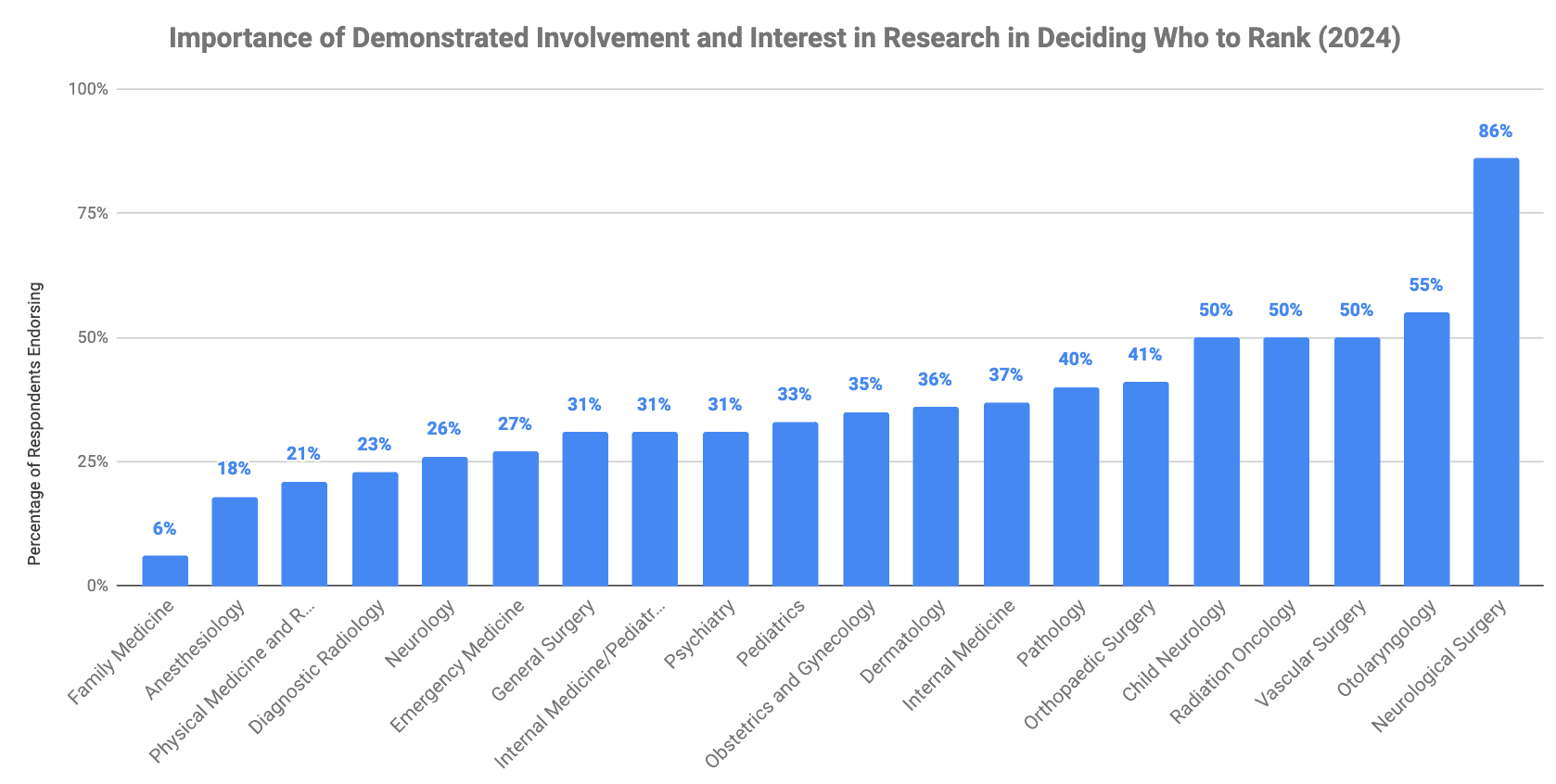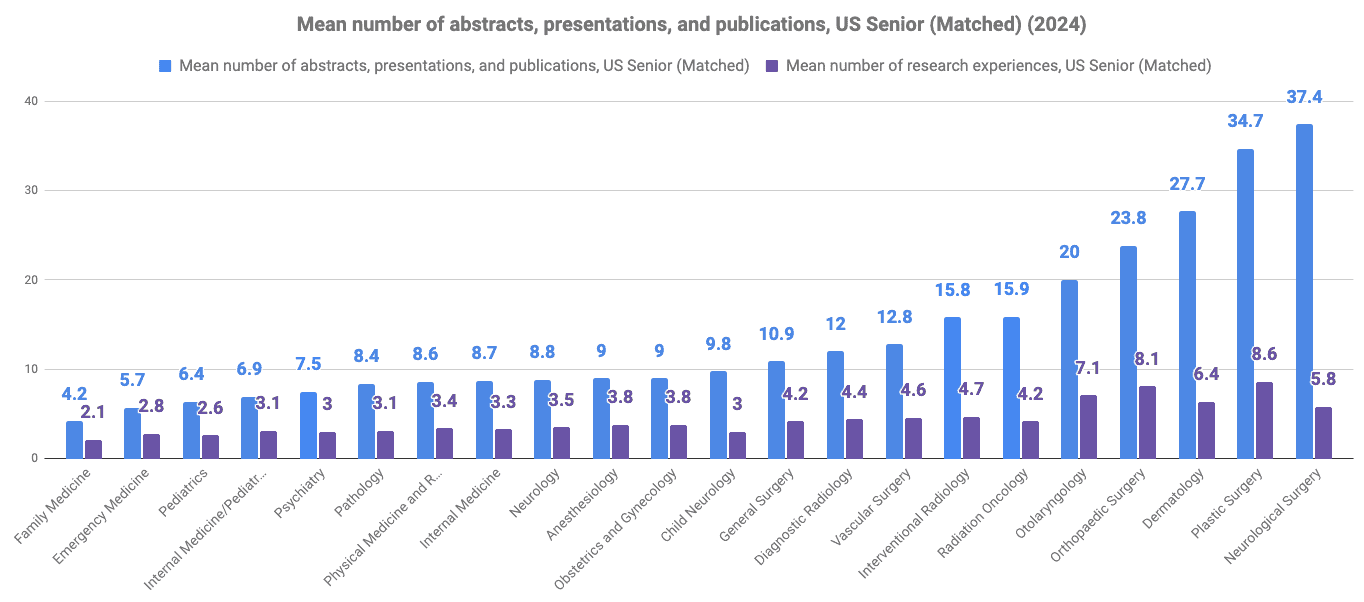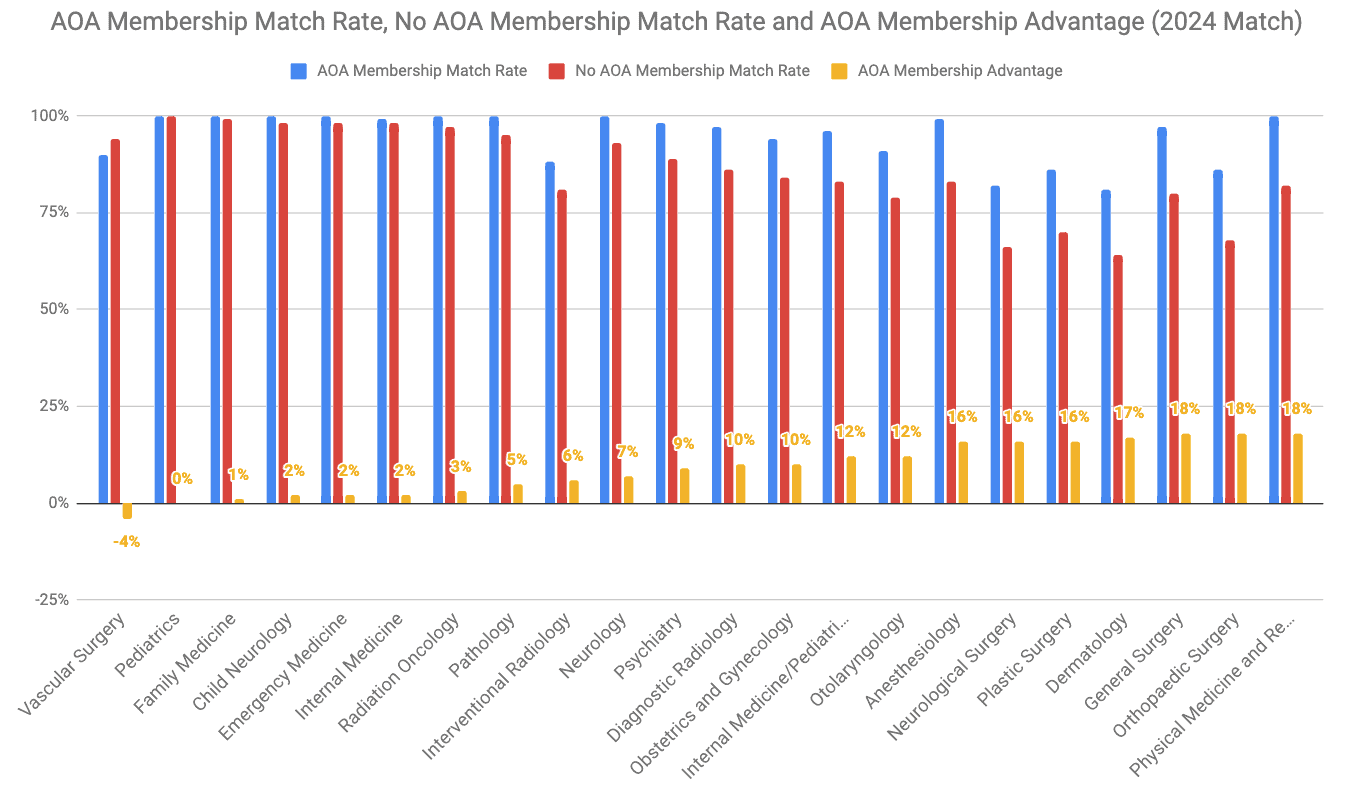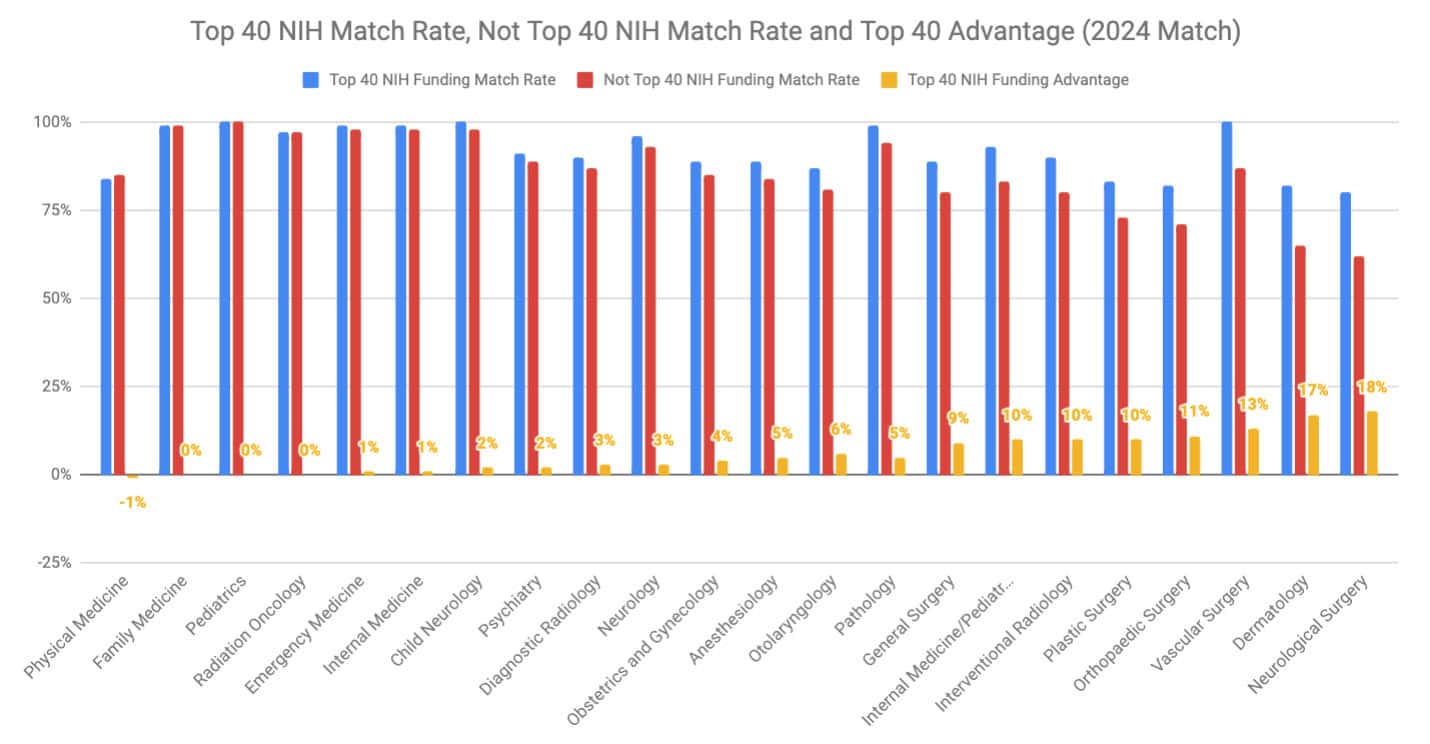
Have you ever wondered how research experience can be a game-changer in your residency application? You’re not alone. Many medical students are unsure if their research background is strong enough or if it even matters for their chosen specialty. The truth is research doesn’t hold the same weight across all specialties. Some specialties prioritize it more than others, and knowing where research experience can give you an edge is crucial
In this article, we’ll dive into NRMP Match data to reveal the top ten specialties that place the greatest emphasis on research. By looking into these specialties, you’ll understand where your research efforts can make the most impact and improve your chances!
How Much Does Research Matter in Residency Applications?
Good news: program directors have answered this question. Their biannual survey, recently released in 2024, addressed what factors they used to interview and rank applicants to their programs.
According to the 2024 Program Director Survey, 42% of program directors consider demonstrated research involvement an important factor when deciding who to interview, while only 30% consider it when deciding who to rank. This means that research plays a more significant role when deciding who to interview than it does when ranking candidates.
| Characteristics Considered in Deciding Whom to Interview | Percentage of Respondents Endorsing | Mean Importance Rating |
|---|---|---|
| USMLE Step 1 pass | 90% | 4.5 |
| Medical Student Performance Evaluation (MSPE/Dean's Letter) | 85% | 4.1 |
| Letters of recommendation in the specialty | 84% | 4.2 |
| USMLE Step 2 Clinical Knowledge (CK) score | 83% | 4.2 |
| Personal Statement | 81% | 4 |
| Any failed attempt in USMLE | 77% | 4.4 |
| History of having overcome significant obstacles | 74% | 4.1 |
| Perceived commitment to specialty | 72% | 4.4 |
| Diversity characteristics | 72% | 4 |
| Leadership qualities | 72% | 4.2 |
| Grades in required clerkships | 70% | 4 |
| Class ranking/quartile | 66% | 3.9 |
| Evidence of professionalism and ethics | 66% | 4.5 |
| Receipt of preference (program) signal | 63% | 4.1 |
| COMLEX-USA Level 1 pass | 62% | 4.5 |
| Any failed attempt in COMLEX-USA | 62% | 4.4 |
| Volunteer/extracurricular experiences | 61% | 3.9 |
| Geographic preferences | 60% | 3.9 |
| Other life experience | 60% | 4 |
| Grades in clerkship in desired specialty | 60% | 4.2 |
| Audition elective/rotation within your department | 60% | 4.2 |
| Personal prior knowledge of the applicant | 58% | 4.2 |
| COMLEX-USA Level 2 Clinical Evaluation (CE) score | 56% | 4.2 |
| Consistency of grades | 50% | 4 |
| Awards or special honors in clinical clerkships | 48% | 3.6 |
| Gold Humanism Honor Society (GHHS) membership | 48% | 3.6 |
| Evidence of continuous medical education without gaps | 43% | 3.9 |
| Alpha Omega Alpha (AOA) membership | 43% | 3.5 |
| Demonstrated involvement and interest in research | 42% | 3.7 |
| Awards or special honors in clerkship in desired specialty | 39% | 3.8 |
| Accreditation status of applicant's medical school | 37% | 4.2 |
| Passing USMLE Step 2 Clinical Skills (CS) | 36% | 4.2 |
| Ability to work legally in the U.S. without a visa | 35% | 4.2 |
| Visa status | 33% | 3.9 |
| Graduate of highly-regarded medical or osteopathic school | 31% | 3.5 |
| Fluency in language spoken by your patient population | 30% | 3.7 |
| Away rotation in your specialty at another institution | 26% | 3.8 |
| Passing COMLEX-USA Level 2 Performance Evaluation | 25% | 4.2 |
| Applicant was flagged with Match violation by the NRMP | 23% | 4.8 |
| Sigma Sigma Phi (osteopathic honor society) membership | 21% | 3.5 |
| Interest in academic career | 19% | 3.7 |
| Awards or special honors in basic sciences | 18% | 3.1 |
| USMLE Step 3 score | 13% | 3.4 |
| COMLEX-USA Level 3 score | 10% | 3.4 |
| How applicant's medical school handled virtual rotations | 5% | 3.3 |
Similarly, the following factors influence how they rank applicants for their programs.
| Characteristics Considered in Deciding Whom to Rank | Percentage of Respondents Endorsing | Mean Importance Rating |
|---|---|---|
| Interpersonal skills | 89% | 4.8 |
| Interactions with faculty during interview and visit | 87% | 4.8 |
| Feedback from current residents | 76% | 4.6 |
| Interactions with house staff during interview and visit | 76% | 4.7 |
| USMLE Step 2 Clinical Knowledge (CK) score | 65% | 4.2 |
| Letters of recommendation in the specialty | 65% | 4.1 |
| Medical Student Performance Evaluation (MSPE/Dean’s Letter) | 64% | 4.1 |
| Personal Statement (overall) | 63% | 3.9 |
| Perceived commitment to specialty | 63% | 4.4 |
| Leadership qualities | 63% | 4.2 |
| Evidence of professionalism and ethics | 61% | 4.6 |
| Diversity characteristics | 61% | 4.1 |
| History of having overcome significant obstacles | 60% | 4.1 |
| USMLE Step 1 pass | 60% | 4.5 |
| Personal prior knowledge of the applicant | 52% | 4.4 |
| Audition elective/rotation within your department | 51% | 4.4 |
| Other life experience | 51% | 4 |
| Class ranking/quartile | 50% | 3.9 |
| Any failed attempt in USMLE | 47% | 4.4 |
| Grades in required clerkships | 46% | 4 |
| COMLEX-USA Level 2 Clinical Evaluation (CE) score | 45% | 4.2 |
| COMLEX-USA Level 1 pass | 43% | 4.5 |
| Volunteer/extracurricular experiences | 43% | 4 |
| Geographic preferences | 40% | 4 |
| Any failed attempt in COMLEX-USA | 40% | 4.4 |
| Grades in clerkship in desired specialty | 38% | 4.1 |
| Consistency of grades | 34% | 4 |
| Evidence of continuous medical education without gaps | 30% | 4 |
| Receipt of preference (program) signal | 30% | 3.9 |
| Demonstrated involvement and interest in research | 29% | 3.7 |
| Gold Humanism Honor Society (GHHS) membership | 29% | 3.7 |
| Alpha Omega Alpha (AOA) membership | 28% | 3.6 |
| Awards or special honors in clinical clerkships | 28% | 3.7 |
| Passing USMLE Step 2 Clinical Skills (CS) | 27% | 4.3 |
| Awards or special honors in clerkship in desired specialty | 25% | 3.8 |
| Ability to work legally in the U.S. without a visa | 23% | 4.3 |
| Fluency in language spoken by your patient population | 22% | 3.8 |
| Visa status | 22% | 4 |
| Graduate of highly-regarded medical or osteopathic school | 22% | 3.7 |
| Accreditation status of applicant’s medical school | 22% | 4.2 |
| Passing COMLEX-USA Level 2 Performance Evaluation | 20% | 4.3 |
| Away rotation in your specialty at another institution | 18% | 4 |
| Other post-interview contact | 18% | 3.8 |
| Applicant was flagged with Match violation by the NRMP | 16% | 4.7 |
| Interest in academic career | 16% | 3.8 |
| Sigma Sigma Phi (osteopathic honor society) membership | 15% | 3.6 |
| USMLE Step 3 score | 12% | 3.7 |
| Awards or special honors in basic sciences | 11% | 3.3 |
| Applicant facility with meeting platform technology | 10% | 3.5 |
| Second interview/visit | 10% | 3.8 |
| COMLEX-USA Level 3 score | 8% | 3.7 |
| How applicant’s medical school handled virtual rotations | 4% | 3.5 |
Specialties That Prioritize Research Experience
Here’s what you need to know: the more competitive the specialty, the more importance it places on research. If you’re targeting competitive fields like neurological surgery or otolaryngology, research involvement is often a decisive factor.
The following graph showing how program directors from different specialties value research involvement when deciding who to interview. This will give you valuable insights into where your research efforts may carry the most weight.
Similarly, the graph below illustrates how they prioritize research involvement when selecting candidates to rank.
Research Requirements for Residency Applications
Trying to figure out how many publications you need for residency applications? Based on the 2024 Charting Outcomes in the Match reports, we can see the average number of research experiences and the mean number of abstracts, presentations, and publications for matched US seniors for each specialty.
How Many Publications for Competitive Residencies?
The answer depends on the specialty you’re aiming for. Some of the most competitive specialties such as neurological surgery, plastic surgery, and dermatology expect a significant amount of publications. For example, applicants to neurosurgery had an average of 37 publications, presentations, and abstracts in the 2024 Match.
Here’s a quick look at the top 10 specialties with the highest average number of publications in 2024
-
-
- Neurological surgery (37.4 abstracts, presentations, and publications on average)
- Plastic surgery (34.7)
- Dermatology (27.7)
- Orthopaedic surgery 23.8)
- Otolaryngology (20)
- Radiation oncology (15.9)
- Interventional radiology (15.8)
- Vascular surgery (12.8)
- Diagnostic radiology (12)
- General Surgery (10.9)
-
AOA and Medical School Prestige: Do They Matter?
AOA in med school refers to “Alpha Omega Alpha,” the national medical honor society. Each school can choose up to 20% of its graduating students, up to 25 residents or fellows, up to 10 faculty members, and three to five alumni. These individuals are selected for their excellence and qualities that match AΩA’s mission and values, which include a commitment to academic achievement, research and scholarship, leadership, ethics, professionalism, and service to both the school and the broader community.
Here we graph the match rate (% of applicants who matched in a given specialty) by AOA status for each specialty in the 2024 Match.
Similarly, some program directors may prioritize applicants with research experience or those who have graduated from research-focused medical schools. Below we’ve graphed the match rate (% of applicants that matched in that specialty) for US seniors based on whether they attended a school inside vs. outside of the top 40 for NIH funding.
One obvious limitation to the data presented above is that it only shows whether someone matches into a specialty or not, without telling us how well they matched into their desired program. In other words, the data tells us if a match occurred, but not whether it was into the program the applicant truly aimed for.
So, how much does AOA (Alpha Omega Alpha Honor Medical Society) and attending a school inside the top 40 for NIH funding really matter when it comes to matching into a specific residency program?
Well, the good news is that program directors have also weighed in on this in their recently released 2024 survey.
Table for Interviews:
| Characteristics Considered in Deciding Whom to Interview | Percentage of Respondents Endorsing | Mean Importance Rating |
|---|---|---|
| USMLE Step 1 pass | 90% | 4.5 |
| Medical Student Performance Evaluation (MSPE/Dean's Letter) | 85% | 4.1 |
| Letters of recommendation in the specialty | 84% | 4.2 |
| USMLE Step 2 Clinical Knowledge (CK) score | 83% | 4.2 |
| Personal Statement | 81% | 4 |
| Any failed attempt in USMLE | 77% | 4.4 |
| History of having overcome significant obstacles | 74% | 4.1 |
| Perceived commitment to specialty | 72% | 4.4 |
| Diversity characteristics | 72% | 4 |
| Leadership qualities | 72% | 4.2 |
| Grades in required clerkships | 70% | 4 |
| Class ranking/quartile | 66% | 3.9 |
| Evidence of professionalism and ethics | 66% | 4.5 |
| Receipt of preference (program) signal | 63% | 4.1 |
| COMLEX-USA Level 1 pass | 62% | 4.5 |
| Any failed attempt in COMLEX-USA | 62% | 4.4 |
| Volunteer/extracurricular experiences | 61% | 3.9 |
| Geographic preferences | 60% | 3.9 |
| Other life experience | 60% | 4 |
| Grades in clerkship in desired specialty | 60% | 4.2 |
| Audition elective/rotation within your department | 60% | 4.2 |
| Personal prior knowledge of the applicant | 58% | 4.2 |
| COMLEX-USA Level 2 Clinical Evaluation (CE) score | 56% | 4.2 |
| Consistency of grades | 50% | 4 |
| Awards or special honors in clinical clerkships | 48% | 3.6 |
| Gold Humanism Honor Society (GHHS) membership | 48% | 3.6 |
| Evidence of continuous medical education without gaps | 43% | 3.9 |
| Alpha Omega Alpha (AOA) membership | 43% | 3.5 |
| Demonstrated involvement and interest in research | 42% | 3.7 |
| Awards or special honors in clerkship in desired specialty | 39% | 3.8 |
| Accreditation status of applicant's medical school | 37% | 4.2 |
| Passing USMLE Step 2 Clinical Skills (CS) | 36% | 4.2 |
| Ability to work legally in the U.S. without a visa | 35% | 4.2 |
| Visa status | 33% | 3.9 |
| Graduate of highly-regarded medical or osteopathic school | 31% | 3.5 |
| Fluency in language spoken by your patient population | 30% | 3.7 |
| Away rotation in your specialty at another institution | 26% | 3.8 |
| Passing COMLEX-USA Level 2 Performance Evaluation | 25% | 4.2 |
| Applicant was flagged with Match violation by the NRMP | 23% | 4.8 |
| Sigma Sigma Phi (osteopathic honor society) membership | 21% | 3.5 |
| Interest in academic career | 19% | 3.7 |
| Awards or special honors in basic sciences | 18% | 3.1 |
| USMLE Step 3 score | 13% | 3.4 |
| COMLEX-USA Level 3 score | 10% | 3.4 |
| How applicant's medical school handled virtual rotations | 5% | 3.3 |
Strategies for Building Research Experience
If you are looking to enhance your residency application, here are some practical tips to build a strong research profile:
Start Early
The sooner, the better. Whether you’re an undergraduate or in your first year of med school, starting early gives you more time to develop meaningful research experience.
Understanding Your Specialty’s Needs
Different specialties expect different amounts of research. Competitive fields like neurosurgery and dermatology often require extensive research involvement. That being said, knowing what’s expected for your specialty helps you focus your efforts.
Expand Your Network
Connect with professors or doctors involved in research. They can guide you, mentor you, and invite you to join valuable ongoing projects, which can be a huge advantage.
Summer Research
Summers are perfect for focusing on research without schoolwork getting in the way. Many programs offer summer internships where you can gain hands-on experience and make meaningful progress.
Keep Track of Your Work
Document everything you do in your research, including your role, your tasks, and the outcomes. This will make it much easier to update your resume or prepare for interviews.
Conclusion
Research experience can be the key to standing out, especially in highly competitive specialties like neurosurgery, dermatology, or plastic surgery. It shows your commitment to learning, your ability to contribute to the field, and your determination to excel.
To maximize your chances of matching your dream specialty, align your research efforts with the specific expectations of that specialty. By starting early, expanding your network, and staying focused on your goals, you’ll be well-prepared to stand out in the competitive residency process.

